Delta Air Lines is to launch its own innovation lab to help accelerate the research, design and testing of ideas and technologies aimed at leading to a more sustainable future of air travel and help reach the airline’s goal of net zero emissions by 2050. The Delta Sustainable Skies Lab will feature work already ongoing at the airline and pair the operational expertise of its teams from different divisions with outside innovators “to inspire new ideas and spur industry advancement,” said Pam Fletcher, Delta’s Chief Sustainability Officer, who is leading the strategy. It will include an ‘Engagement & Ideation Studio’ at Delta’s Atlanta headquarters, which will host students, employees, sustainability thought leaders and the “world’s greatest inventors”. The airline said it will continue to test concepts for reducing its environmental impact, including novel technology to decrease aircraft drag and emissions. It is collaborating with MIT to test methods and develop tools to eliminate persistent contrails.
“The Lab will lead the industry by going beyond financial investments, contributing Delta talent and know-how to ensure Delta is the airline of choice for disruptors hoping to test and launch their ideas,” explained Fletcher. “It’s a place to showcase advancements and a movement to galvanise everyone with a stake in creating the more sustainable future of flight.”
The Lab will bring together senior leaders in Delta’s Flight Operations, Technical Operations, Inflight Services, Operations & Customer Center and Fleet, with Delta’s Carbon Council serving as the model. “Much like Delta views safety, sharing best practices and being transparent about its sustainability approach is central to The Lab’s mission,” said the airline, which pointed out that more than 10 million gallons in fuel savings had resulted in 2022 alone.
However, said Fletcher: “With aviation being a hard-to-decarbonise industry, none of us can do this alone. We’re rolling out the welcome mat for disruptors of choice to take advantage of Delta’s global resources.”
The Lab will attract the next generation of ‘doers’ who evolve how airlines think about decarbonisation, expects the airline, and join other previously announced sustainability partners such as Airbus and eVTOL start-up Joby Aviation. Last October, Delta announced an upfront equity investment of $60 million in Joby, with a potential total of $200 million if milestones are achieved, which envisages using Joby’s eVTOL aircraft to operate city-to-airport services, initially in New York and Los Angeles.
The collaboration with MIT’s Department of Aeronautics and Astronautics will harness an MIT-created algorithm that predicts altitudes and locations where contrails are likely to form and study the causes of persistent contrails, assess the environmental impact and test possible solutions. The tools and technology planned as part of the study are being created under an open-source licence that will allow others to join in advancing the work.
Under a Memorandum of Understanding with Aero Design Labs, the airline will be testing drag-reduction technology on its 737-800 and 737-900 fleets starting this quarter. Delta will have the option to purchase ADL’s ADRS kits upon FAA certification to outfit most of its more than 200 aircraft in the two fleets.
The Engagement Studio will open and operate in phases and will feature interactive digital walls, virtual reality stations and experiential mock-ups, and welcome stakeholders to meet, collaborate and share ideas “to build momentum across the industry and beyond.”
Added Fletcher: “This work is imperative for our planet and our business. We’ve seen how critical human connection is to thrive – and how travel is the great enabler. As we make progress towards our sustainability goals, we want to make sure our customers will feel as good about flying as they do about the connections made with the people and places we take them to.”
Image: The Delta Sustainable Skies Lab vision concept


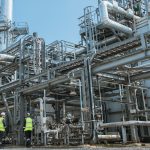
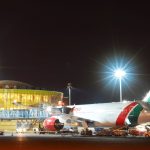
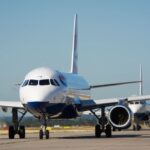
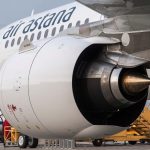

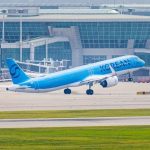



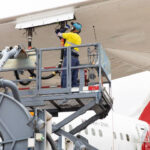



More News & Features
US rebukes ICAO for wasting resources on climate financing initiatives and warns against global levies
Aviation needs better measurement to deliver meaningful decarbonisation
More targeted and faster measures needed to overcome barriers and unlock SAF’s full potential, finds PA study
Legal analysis finds countries must include aviation non-CO2 emissions in their climate action plans
Unifuel’s 100% drop-in SAF production technology passes first test in ASTM qualification process
NATS survey shows a continuing disconnect of public attitudes to the environmental impact of flying